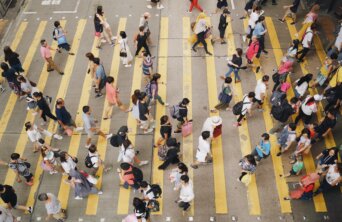- About
- Topics
- Picks
- Audio
- Story
- In-Depth
- Opinion
- News
- Donate
- Signup for our newsletterOur Editors' Best Picks.Send
Read, Debate: Engage.
| topic: | Freedom of Expression |
|---|---|
| located: | Hong Kong, China |
| editor: | Sun Ma |
Since the 2020 protests in Hong Kong, the largest in its history, the Chinese government has tightened its grip on Hong Kongers’ freedom of expression and ability to access cultural content that might be deemed subversive or revolutionary.
In 2021, the Chinese government passed a new censorship law that banned any films that could “incite activities that could endanger national security.” This law has made it increasingly difficult for artists to share any work that hints at political messaging.
However, most recently this censorship has unexpectedly taken aim at a children’s character: Winnie the Pooh.
The new movie Winnie the Pooh: Blood and Honey, which was released in the US in February and across the UK in March, portrayed the lovable bear as a half-human, half-bear seeking revenge with an axe. It was initially set for public screening in about 30 cinemas in Hong Kong, according to film distributor VII Pillars Entertainment. However, they were notified two days before the screening that the cinemas would cancel due to “technical reasons.”
While these "technical reasons" were not explained by the authorities in Hong Kong, it is no secret that the Chinese government has been cracking down on any reference to the lovable bear in recent years.
The Winnie the Pooh meme, which began circulating in 2013 after an image of President Xi Jinping and former US President Barack Obama compared the two politicians to Winnie the Pooh and his friend Tigger, has been used to criticise China's leader and has become a symbol of dissent.
Since then, the government has gone to great lengths to censor any mention of the character.
It is clear that the Chinese government will not tolerate any deviation from their strict control over the media. This move has sparked concerns about the future of free speech in Hong Kong, which was once known for its vibrant cultural scene and independent media. And this is not an isolated incident.
On one of the city’s busiest squares, a digital artwork named “No Rioters” by Patrick Amadon, hung over a department store for several days. The painting was able to sneak past the contentious national security law.
But soon after the media reported that the painting contained hidden references to jailed dissidents and increased surveillance measures, the artwork was removed. Once again, the strict censor challenges the city’s identity as a vibrant art scene.
These episodes raise important questions about China's relationship with Hong Kong’s people. The territory was promised a high degree of autonomy when it was handed back to China by the UK in 1997, but recent moves by the Chinese government, including the introduction of a new national security law, have been seen as a warning to this arrangement.
By censoring the Winnie the Pooh horror movie in Hong Kong and the painting, China is sending a message that it will not tolerate any dissent or criticism. It is a worrying sign of China's increasing control over the media and cultural scene and as a result, the energetic city will likely lose its vibrancy in the future.
It is crucial that the people have the freedom to speak out against such moves, and stand up for their right of freedom of expression. The people of Hong Kong must not let fear and intimidation silence their voices, or limit their ability to explore new ideas and the development of art and culture.
Image by Gigi

